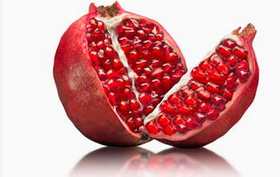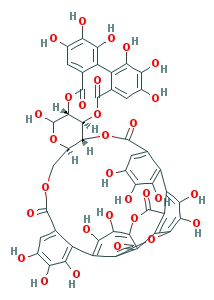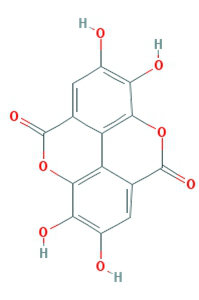PRODUCTS
Contact us
+86-731-86207286
Company:ChangSha Phyto Nutrition Inc.
Address:Xingsha HighTech & Development Zone Changsha China.(410100)
Email:sales@phyto-nutrition.com
Pomegranate Extract
time:2017-03-05 author: phyto-nutrition

Pomegranate Extract
1. Sources and Habitat
Pomegranate (Punica granatum L in Latin), belongs to the family Punicaceae which includes only one genus and two species.
The pomegranate tree is native from Iran to the Himalayas in northern India and has been cultivated since ancient times throughout the Mediterranean region of Asia, Africa and Europe.
2. Descriptions and Specifications of Product
Specifications: 40% Punicalagin A + B Test by HPLC
40% Ellagic Acid Test by HPLC
90% Ellagic Acid Test by HPLC
Punicalagin
Molecular Formula: C48H28O30
Molecular Mass: 1084.72
CAS No.: 65995-63-3
Constititional Formula:

Ellagic Acid
Molecular Formula: C14H6O8
Molecular Mass: 302.20
CAS No.: 476-66-4
Constititional Formula:

3. Indications and Uses
Anti-cancer and anti-mutation. Restrain to human immunodeficiency
Anti-oxidant, coagulant, descenting blood pressure and sedation
Treat kinds of symptoms caused by high blood sugar, hypertension
Resist to atherosclerosis and tumour
Resist to anti-oxidance, senescence inhibition and skin whitening
4. Safety Concerns
Pomegranate should not be used by pregnant and nursing women, and overuse (many times the recommended dosage) may cause cramps, vomiting and diarrhea. Pomegranate fruit should not be taken if you have diarrhea, and in Traditional Chinese Medicine (TCM), Pomegranate fruit should not be taken with oil or fats when used to treat parasite infections. Some people who are allergic to Pomegranate are also allergic to other fruits, pollen or nuts.
5. Dosage Information
In the most significant clinical studies to date, a daily dose of 78 mg of punicalagins yielded such remarkable benefits as reversing atherosclerosis, reducing high blood pressure, and preventing the adverse cardiovascular consequences of diabetes. Moreover, an important clinical study demonstrated that 280-375 mg of punicalagins per day halted the progression of prostate cancer in men who had failed conventional therapy.26 Life Extension thus recommends 78 mg of punicalagins per day for cardiovascular protection, and 280-375 mg of punicalagins daily to promote prostate health.



